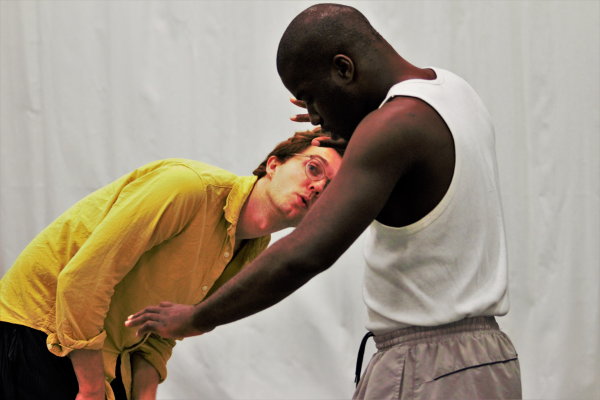13 February 2025
For Flute Theatre, Shakespeare Shows How Love Conquers Fear
Kelly Hunter
Theatre Director, Actor, Writer
Kelly Hunter MBE is the Artistic Director of Flute Theatre, and the author of Shakespeare's Heartbeat: Drama Games for Children with Autism. In today's blog, she shares how the loving theatrical practice embraced by Flute Theatre allows autistic people to connect, enjoy, and perform Shakespeare.
If you're a DT+ customer, explore Flute Theatre in this short documentary, and hear from Kelly in this interview on Shakespeare with Inclusive Audiences.
Love Conquers Fear; Revelation Overcomes Dread
Shakespeare took existing stories and transformed them into his plays. I believe these stories have always existed, swirling in circles of invisible dust for actors and storytellers to pick up and bring to life.
But how can we bring them to life for people who cannot make a transition into a theatre, because the very ground under their feet is swaying like a ferry in heavy seas, whilst colours, sounds, and smells compete for sensory dominance, unrestricted in quality and over-powering in quality?
These are the people with whom Flute Theatre shares Shakespeare's stories, in a space where love conquers fear and revelation overcomes dread.
Introducing: Flute Theatre
Our autistic audience for Flute Theatre's specialised productions of Shakespeare remain mostly hidden away from society, excluded from joining social and artistic activities in public spaces.
We perform with people that no one hears from, many non-verbal, from poor to wealthy, young to old, and across race, religion, and ethnicity. There's one common thread: a person, family member (or members) who are autistic, requiring care for the rest of their lives.
 The heartbeat is the first sound we hear in the womb. Image provided by Flute Theatre.
The heartbeat is the first sound we hear in the womb. Image provided by Flute Theatre.
The Hunter Heartbeat Method
Our unique productions use the Hunter Heartbeat Method: sensory drama games that I have created for and with autistic people across the world over the last twenty-five years.
These are games based on four keywords of Shakespeare (as expressed in Louis Zukofsky's 1963 book, Bottom: On Shakespeare):
- Eyes
- Mind
- Reason
- Love
Zukofsky shows how Shakespeare combines and collides these words and their related meanings throughout the plays, endlessly expressing the human experience through the 'seeing mind' and the 'loving mind', which in turn offers a way of making connections with the autistic experience.
These are sensory games of humanity that need only the human voice and body in order to play.
The Hunter Heartbeat Method in Practice
Our interactive productions are performed around a painted floorcloth, with eight actors sitting in a circle with an audience of just 15 autistic participants who become the heart of the performance.
Together, they team up to play sensory games, which depict ecstatic moments in Shakespeare's plays. These include the moment of rapture when the eyes of Miranda and Ferdinand first meet, "at the first sight they have changed eyes" in The Tempest, an opportunity for the autistic participants to explore making eye contact without trepidation or undue pressure.
Another game explores the moment of despair wherein Pericles loses Thaisa at sea and cries out "Oh you Gods, why do you make us love your goodly gifts and snatch them straight away". The game offers an opportunity to express loss and grief, emotions not often encouraged to be expressed freely.
Each sensory game offers the opportunity to experience and express these dizzying emotions, and to repeat them for as long as feels pleasurable. The actors adapt the games depending on the needs of the participants, including those who are non-verbal, and no one is ever excluded from participating.
 No one is ever excluded from participating. Image provided by Flute Theatre.
No one is ever excluded from participating. Image provided by Flute Theatre.
We begin our shows standing in the street making Heartbeat Hellos. The moment our autistic audience approaches, we sing a repeated Hello to the rhythm of a heartbeat, creating a welcoming womb-like soundscape. The heartbeat is the first sound we hear in the womb, and is also the base line of Shakespeare's iambic pentameter.
One autistic friend told me her life was a 24/7 panic attack that never ceases, her heartbeat was never steady. The continuous rhythm of our womblike soundscape from arrival until settling for the performance, creates a web of reverberation that helps combat the potential stress caused by changes in light, sound, and temperature; a physical and aural effort of love combatting fear.
An Expression of Online Love
During the pandemic, we adapted our Hello Heartbeats to be accessible online so that we could keep in contact with our community of autistic participants. From March 2020, we ran an Instagram livestream singing and repeating the Hellos for one hour in the morning and one hour in the evening. Our autistic participants joined us on the stream, and we would sing their names.
One parent said, "Everyone thought this was madness, just repeating hello hello hello... except for those who understood autism. For us, it was a miracle." His son found his voice during those online sessions, and for the first time, his parents heard his voice as he said "Hello" and sang. His father called it an "expression of online love".
Flute Theatre has continued to survive since the pandemic, and that love continues to be freely given and received every time we perform.
Flute Theatre provides productions of Shakespeare for autistic individuals. Kelly Hunter will be running Courses in the Hunter Heartbeat Method this Spring/Summer. To express your interest, please email flutetheatrecompany@gmail.com.
Share the Shakespeare love this Valentine's Day with free resources for younger learners.
Related blogs
3 Ways to Unlock Characterization in Julius Caesar [Free PDF]
First performed in 1599, Julius Caesar is often dubbed Shakespeare's most rhetorical play, making...
Read moreInteractive playtexts make ‘page to stage’ a reality
Educators have long written about the journey from ‘page to stage’. This usually refers to the...
Read moreEmma Rice on Putting the 'Play' back into Theatre Making
Emma Rice is amongst the UK's best known, and most loved, theatre makers. In the course of her...
Read moreGet the latest teaching tips straight to your inbox
Explore free lesson ideas and inspiration, education news, teaching trends and much more by signing up to regular blog updates!





